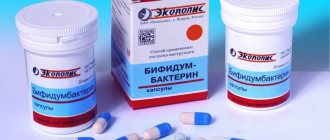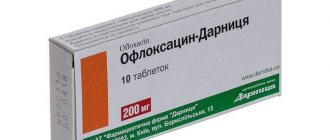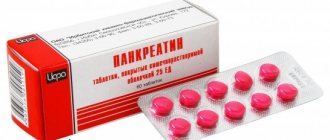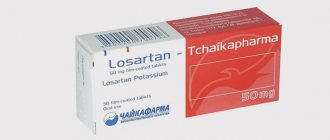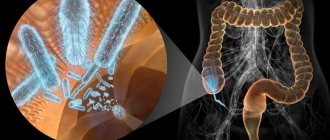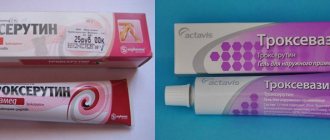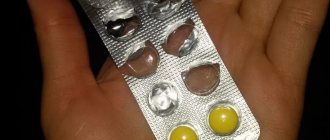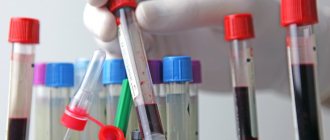For constipation and problems with bowel movements, medications are prescribed that enhance and accelerate the peristalsis of the gastrointestinal tract, which promotes natural bowel movement. This is very important in the treatment of helminthic infestations. All products of this type are of synthetic and plant origin. Good medicines of the first group include Bisacodyl. How long does it take for Bisacodyl to work? The effect of use is determined by the dosage form of the drug - tablets/dragées or suppositories, the latter option acts much faster.
Release form and composition
The dosage form of Bisacodyl-Hemofarm is tablets coated with an enteric sugar coating: yellow, round (in a cardboard pack there are 3 blisters of 10 tablets each).
Composition of 1 tablet:
- active substance: bisacodyl – 5 mg;
- auxiliary components: lactose monohydrate – 23.677 mg; corn starch – 23.677 mg; povidone K-25 – 1.121 mg; sodium carboxymethyl starch – 1.979 mg; colloidal silicon dioxide – 0.273 mg; Magnesium stearate – 0.273 mg;
- enteric coating: copolymer of methacrylic acid and methyl methacrylate (1:1) – 5 mg; macrogol 6000 – 0.55 mg; talc – 1.5 mg;
- sugar shell: sucrose – 22.36 mg; acacia gum – 1.392 mg; macrogol 6000 – 0.032 mg; talc – 12.733 mg; yellow quinoline dye (E 104) – 2.717 mg; titanium dioxide (E 171) – 2.717 mg.
Possible side effects and overdose
In most cases, reviews about the drug are positive. The tablets are well tolerated by patients and do not cause general serious conditions.
Some people may experience cramps, colic, pain, and abdominal discomfort. This occurs due to irritation of the intestinal walls. The manifestations of dyspepsia intensify - increased gas formation, loose stools, dryness of the oral mucosa, thirst, nausea, and sometimes vomiting.
If the medicine is taken for a long time, persistent intestinal atony, inflammation of the intestinal mucosa, and melanosis (accumulation in the intestine of pigment that colors the stool dark brown) develop over more than 10 days.
Rare side effects caused by Bisacodyl tablets:
- general weakness, dizziness;
- peripheral vascular spasms;
- cramps of the calf muscles;
- allergies ─ skin itching, rashes, angioedema.
In elderly patients, there is a lack of coordination of movement, a drop in blood pressure when changing body position from horizontal to vertical, impotence, and a violation of the water-salt balance in the body.
When used in high doses, tablets increase negative effects from the gastrointestinal tract - abdominal pain, cramps, dyspeptic disorders, salt imbalance. If you use the product for a long time, it will lead to chronic diarrhea and the formation of kidney stones.
Correction of this condition includes gastric lavage, normalization of electrolyte balance, and symptomatic treatment.
Pharmacological properties
Pharmacodynamics
Bisacodyl-Hemofarm is a laxative. Leads to irritation of the intestinal receptor apparatus and directly affects the intestinal mucosa (due to increased peristalsis and increased secretion of mucus in the large intestine).
When taken orally, the effect of the drug occurs after 6 hours; in cases where Bisacodyl-Hemofarm is taken before bedtime – after 8–12 hours.
Pharmacokinetics
It is not absorbed in the intestines.
Bisacodyl is a prodrug; in an alkaline environment, hydrolysis occurs, resulting in the formation of a metabolite that has an irritating effect on the mucous membrane of the gastrointestinal tract.
Bisacodyl suppositories during pregnancy
Many women, while carrying a child, encounter difficulties with bowel movements. The cause of constipation in this case is associated with hormonal changes in the body (in the first months) and the pressure of the growing uterus on the intestines. The main danger of the pathological condition lies in the formation of hemorrhoids in the absence of therapy.
During pregnancy, medication use is limited. It is necessary to select only safe products that do not have a negative effect on the development of the fetus. Bisacodyl suppositories are allowed to be used by women in any trimester of pregnancy. The components of the laxative are practically not absorbed into the general bloodstream, which makes it absolutely safe for both the expectant mother and the baby. Before use, you must consult with your gynecologist.
It is still not worth abusing the medication, because the activation of peristalsis can sometimes cause very painful sensations.
Pregnant women are allowed to use 10 mg of a laxative per day. You should not expect a long-term effect from suppositories. Suppositories allow you to get rid of the problem one-time, but do not affect the cause of constipation.
To get rid of difficulties associated with bowel movements, it is necessary to normalize your diet. It is recommended to limit the consumption of foods that have a fixing effect and introduce plant fiber into the diet. It is important to increase the amount of fluid. During the day you should consume more juices, jelly, and fermented milk products.
By following a simple diet, a pregnant woman will be able to regularly empty her bowels, thereby preventing constipation and hemorrhoids.
Bisacodyl suppositories are allowed to be used during pregnancy after prior consultation with a specialist.
Contraindications
Absolute:
- acute proctitis;
- peritonitis;
- strangulated hernia;
- intestinal obstruction;
- acute inflammatory diseases of the abdominal organs;
- abdominal pain of unknown etiology;
- gastroenteritis;
- acute hemorrhoids;
- appendicitis;
- bleeding from the gastrointestinal tract;
- metrorrhagia;
- spastic constipation;
- cystitis;
- age up to 3 years;
- individual intolerance to any component of the drug.
Carefully:
- renal/liver failure;
- pregnancy and lactation period.
In what cases is the medicine contraindicated?
Discomfort and abdominal pain, which often occur with constipation, are not always a reason to take the drug. There are severe and dangerous conditions in which tablets are contraindicated:
- intestinal obstruction;
- acute inflammatory processes of an infectious or non-infectious nature ─ hemorrhoids, proctitis;
- pinched hernia;
- bleeding in the gastrointestinal tract;
- “acute abdomen” ─ appendicitis, perforated ulcer, peritonitis;
- acute infectious diseases, poisoning, which are accompanied by severe abdominal pain, nausea, vomiting;
- Crohn's disease ─ nonspecific chronic inflammation of all parts of the digestive tract;
- ulcerative colitis;
- severe degree of dehydration.
Bisacodyl should not be taken if you have spastic constipation or individual intolerance to certain components. The medicine is not used in pediatric practice up to 4 years.
There is no data on whether alcohol interacts with the drug. To avoid unforeseen complications, it is recommended to refrain from drinking alcohol while taking Bisacodyl.
According to the official instructions, the drug is not recommended for use during pregnancy, since there is no data on the safety of use for women. The risk of toxic (teratogenic) effects on the fetus, its growth and development is unlikely. Therefore, tablets are prescribed with caution during pregnancy to relieve constipation. If necessary, they can be replaced with Bisacodyl in the form of rectal suppositories for topical use.
During breastfeeding, the drug is also prescribed with caution, only according to strict indications.
Instructions for use of Bisacodyl-Hemofarm: method and dosage
Bisacodyl-Hemofarm is taken orally, preferably 30 minutes before breakfast or before bedtime. The tablets should be swallowed whole with a small amount of water, without chewing or breaking.
Frequency of administration – 1 time per day.
Recommended single dose:
- adults and children over 14 years of age: 1–3 tablets;
- children 8–14 years old: 1–2 tablets;
- children 3–7 years old: 1 tablet.
During the period of preparation for surgical operations, instrumental/radiological examinations, 2 tablets are prescribed at night the day before they are performed and the same dose the night before the operation or examination.
Analogues of Bisacodyl, list of drugs
- Stadalax;
- Pikosen;
- Senadexin;
- Citraflit;
- Guttalax;
- Regulax;
- Normaze.
It is important to understand that the instructions for use of Bisacodyl, price and reviews do not apply to analogues and should not be used as a guide for use. All therapeutic actions, including replacing Bisacodyl with an analogue, must be carried out by a qualified specialist. Reviews from doctors about Bisacodyl tablets indicate a rapid onset of a laxative effect, but they must be taken with caution. It is recommended to start taking it with a minimum dose, since the drug is potent.
Options for losing weight with bisacodyl
You can choose from two.
Option one
Take a tablet every morning. You can combine taking the product with a low-calorie diet, or you can leave everything as is. In this way, you will regularly cleanse your intestines, losing up to 1.5 kg at a time.
The duration of such a diet is not indicated, but doctors do not recommend drinking such a strong laxative for more than three days.
Option two
Cleansing the body
It is produced by taking one tablet once, preferably in the morning.
It is worth remembering that the drug begins to act after approximately 6-8 hours. Therefore, if you take bisacodyl in the evening, there is a risk that your sleep at night will be interrupted by the need to go to the toilet.
It is recommended not to overload your stomach with food on this day and arrange a fasting day for yourself: eat oatmeal, vegetables, drink more water.
Effect on the body
After taking the drug orally, a small part of it is absorbed into the blood. The bulk passes through the stomach and small intestine, and in the large intestine it has an irritating effect on its walls. Under the influence of the drug, the cells that are responsible for the amount of mucus on the lining of the large intestine are activated and increase the amount of lubricant produced.
It envelops feces, which, in turn, facilitates their easy passage through the intestines and through the anus. The drug also enhances peristalsis, which leads to defecation. In order for the active substance to reach its destination, it takes time; the effect of Bisacodyl begins to manifest itself after 4-8 hours.
Do you know what symptoms of drug poisoning appear in a victim?
Read how excess magnesium manifests itself in the body: symptoms of intoxication and first aid.
Feedback from hosts
The abundance of contraindications and side effects does not reduce the number of desperate losers who have tried it on themselves.
Before and after results
Despite its pros and cons, Bisacodyl is quite a popular remedy among young ladies who fanatically fight for every 100 grams of weight and post photos of their successes on the Internet. They take this drug to get rid of food they eat and avoid gaining excess weight. All users note the effectiveness of the product. Reviews constantly contain stories about severe abdominal pain, nausea, vomiting, hours spent in the toilet and... the desired lack of numbers on the scale. Particularly stubborn people get hooked on bisacodyl, violating the timing of dosage and dosage by 2-3 times and come to the point that the drug stops working, and the intestines cannot function independently.
What do the doctor's say
Doctors are unanimous in their opinion: Bisacodyl is not a drug for slimming, it is not intended for regular use.
At most, it can be used on the eve of starting a diet instead of a cleansing enema to give the body a boost, and strictly in the dosage indicated on the package. This is a strong medicine with pronounced and frequent side effects, which should be used strictly according to the instructions in exceptional cases. When using the drug for more than 2 days, it is necessary to introduce vitamins and minerals into the diet, as well as foods rich in fiber.
Price and where to buy
Before choosing an online pharmacy with an acceptable price for the drug and the possibility of delivery to your home or by mail, monitor prices in your city, be it Moscow or St. Petersburg. Thanks to this, purchasing the drug will cost you relatively little, because In some pharmacies, Bisacodyl is sold at slightly inflated prices.
| Name of pharmacy (Moscow) | Price in rubles (5 mg tablets) |
| "ZDOROV.ru-Novogireevo" | 36 |
| "Norma Bolshoi Ovchinnikovsky" | 37,60 |
| "GORZDRAV Zelenograd, 124" | 37,60 |
| "Avicenna Pharma" | 34,50 |
The cost of the drug in tablets is 30 rubles. The price for suppositories is 50 rubles. It is necessary to choose a medicine from the manufacturer Nizhpharm, Altfarm, Hemofarm or Akrikhin. You can purchase the medicine at a pharmacy or order it online.
Over-the-counter release. The packaging should be stored in a dark and dry place. For weight loss, analogues such as Senade, Mukofalk, and suppositories with glycerin are used.
What is it and what is it for?
Bisacodyl is a medicine indicated for the symptomatic treatment of constipation. As you can see, the initial prescription has absolutely nothing to do with losing weight. But after it appeared on the shelves, young ladies quickly noticed that taking this medicine leads to weight loss.
Is it possible to lose weight with this medicine?
With the help of Bisacodyl, you can lose a few extra pounds in a short time, but this can hardly be called weight loss, because weight is lost primarily due to the removal of fluid from the body and cleansing the body of feces.
How not to buy a fake
Do not buy the drug from hand - go to a pharmacy or a trusted online store that sells medicines. Choose products from manufacturers you know: Nizhpharm, Balkanfarm, Hemofarm.
What should the packaging be like?
The original bisacodyl is packaged in a cardboard box, usually with a raised description for the visually impaired. Inside there will definitely be an insert with instructions for use. The blister itself will be even with smooth edges, all tablets will be the same shape, size and color. Watch a review of the product in the video:
Fake and original: what's the difference?
The difference is in the components used. In the most harmless version, the counterfeit version will consist of harmless substances, the dosage of the active substance will be changed, or it will be replaced with a cheaper analogue. But it may also happen that the drug will be completely replaced by an unknown substance and then the consequences will be unpredictable.
Use for weight loss
The purpose of use is to “clean” the intestines, rid the body of unabsorbed remnants of what was eaten, remove toxins and achieve weight loss.
But you need to consider the consequences:
Lazy bowel syndrome
A course longer than 14 days leads to the intestinal tract becoming unaccustomed to working independently. Without taking stimulants daily, it becomes difficult to have a bowel movement.
Discomfort, increased gas formation
They are especially pronounced in inexpensive copies of Dulcolax. The original has better tolerability according to objective data from clinical studies.
Hypokalemia
Excessive loss of potassium ions during course use can manifest itself as painful cramps and cardiovascular disorders. The combination with diuretics, which are also often used for weight loss, is especially dangerous. Diuretics, in addition to the potassium-sparing group (Veroshpiron, Triampur), also lead to potassium loss. With simultaneous use, pronounced disturbances in electrolyte balance are possible.
Recommendations for use
Bisacodyl is used to relieve constipation. Systematic delay in emptying is not an indication for the use of the drug, since the drug relieves symptoms and does not eliminate the root cause of the disorder. Indications for use are:
- acute disturbances in the bowel movement process;
- weakening of intestinal peristalsis;
- atonic intestinal disorders caused by a change in the usual diet, bed rest, etc.;
- the need for mandatory bowel movement (in case of poisoning, specific studies - colonoscopy);
- delayed emptying after surgery or the birth process;
- for the prevention of constipation in diseases of the rectum - proctitis, anal fissures, hemorrhoids.
Sulfuric acid poisoning
Possible side effects
The product has a lot of disadvantages. The list of side effects is quite wide. This:
- Abdominal pain and flatulence.
- Severe diarrhea.
- Dehydration and water-electrolyte imbalance.
- Convulsions, decreased blood pressure, weakness.
- Allergic reactions.
- Intestinal atony.
- Fainting.
- For suppositories – pain in the anal area.
Overdose
Overdose symptoms are associated with increased side effects. Severe diarrhea is observed, resulting in loss of large amounts of fluid and electrolytes. Loss of potassium leads to muscle weakness, heart rhythm disturbances, seizures and low blood pressure. If your health deteriorates seriously, gastric lavage may be required.
Indications for use
According to the instructions for use, Bisacodyl suppositories are indicated for constipation - severe hardening of the stool, which is accompanied by the impossibility of defecation. The development of constipation occurs as a result of pathological processes occurring in the digestive system. These include:
- Intestinal hypotension, which is characterized by a decrease in the tone of the smooth muscle fibers of the organ walls. This leads to a decrease in the intensity of peristalsis and stagnation of feces in the lower sections with their further compaction. The development of intestinal hypotension is facilitated by infectious diseases, age-related changes in the body of older people, as well as disturbances in the innervation of this organ by fibers of the autonomic nervous system. Quite often, this pathology develops in people who are forced to stay in bed for a long time, for example, in patients after major operations.
- The need to loosen stools if there are hemorrhoids.
- Functional constipation, which develops due to poor diet.
In addition, Bisacodyl suppositories are often used to loosen stools in order to cleanse the intestines before endoscopic examination, intestinal radiography, and ultrasound examination.
According to the instructions for the drug Bisacodyl, the following physiological and pathological conditions of the body are contraindications to the use of suppositories:
- mechanical intestinal obstruction - in this case, stimulation of peristalsis with suppositories can provoke the development of various complications;
- acute proctitis, which is inflammation in the rectum;
- impaired digestion and absorption of lactose or glucose;
- acute inflammation of hemorrhoids, accompanied by the risk of bleeding from them;
- spastic constipation - in this case, the movement of food masses is disrupted due to narrowing of the intestines, which occurred as a result of too strong an increase in the tone of the smooth muscles of its walls;
- bleeding from any part of the gastrointestinal tract - in this case, Bisacodyl suppositories can increase the intensity of bleeding;
- inflammatory diseases of the abdominal organs, occurring in acute form;
- peritonitis is an acute inflammation of the peritoneum, covering the walls and loops of the abdominal cavity;
- strangulated hernia, a loop of intestine in which is located in the hernial sac;
- lactose enzyme deficiency;
- children under three years of age - Bisacodyl suppositories can cause rapid dehydration of the child’s body;
- intolerance to the components of the drug.
- acute condition of constipation;
- intestinal atony after prolonged bed rest, changes in diet or environment;
- hypotension and sluggish peristalsis of the colon (for example, in elderly patients);
— bowel emptying before examinations (X-ray, endoscopic), before and after operations, in case of severe cardiovascular diseases, during childbirth;
Intestinal obstruction, strangulated hernia, acute inflammatory diseases of the abdominal cavity (appendicitis, diverticulitis), potassium deficiency, peritonitis, bleeding from the gastrointestinal tract, uterine bleeding, cystitis, spastic constipation, acute proctitis, acute hemorrhoids, increased sensitivity to
The drug should not be used in the following cases:
- Appendicitis, peritonitis, diverticulitis.
- Pain inside the abdomen of unknown etiology.
- Gastric and intestinal bleeding.
- Strangulated hernia.
- Pancreatitis, gastritis, hepatitis, acute enteritis.
- Bleeding from the anus and rectum.
- Cystitis.
- Children under 2 years of age.
- Hypersensitivity to Bisacodyl.
- Intestinal obstruction.
- Hemorrhoids, proctitis in acute form.
- Uterine bleeding.
- Dehydration of the body.
- Potassium deficiency.
Bisacodyl is a fairly strong drug and can and should be used only strictly if indicated.
Hypersensitivity, strangulated hernia, intestinal obstruction, spastic constipation, acute hemorrhoids, acute proctitis, acute inflammatory diseases of the abdominal organs, peritonitis, abdominal pain of unknown origin, bleeding from the gastrointestinal tract, uterine bleeding, cystitis, water-electrolyte imbalance, colon carcinoma (for suppositories), children under 2 years of age.
What does Bisacodyl help with? According to the instructions, the drug is prescribed in the following cases:
- acute condition of constipation;
- intestinal atony due to prolonged bed rest, changes in diet or environment;
- hypotension and sluggish peristalsis of the colon (for example, in elderly patients);
- bowel emptying before examinations (X-ray, endoscopic), before and after operations, in case of severe cardiovascular diseases, during childbirth.
Bisacodyl photo suppositories and tablets
Constipation caused by hypotension and sluggish peristalsis of the colon (particularly in elderly patients; constipation after surgery, childbirth).
Regulation of bowel movements for hemorrhoids, proctitis, anal fissures.
Preparation for surgical operations, instrumental and x-ray examinations.
Side effects may include:
- Dyspeptic disorders - belching, heartburn, nausea, etc.;
- Flatulence (increased gas formation in the intestines);
- Colicky pain in the abdominal cavity;
- Allergies;
- Pain in the anus (if suppositories were used);
- General weakness of the body;
- Diarrhea, which may be accompanied by dehydration;
- Muscle weakness and hypotension (decrease in blood pressure);
- Intestinal atony, etc.
Overdose
The use of high doses can cause diarrhea and cramping abdominal pain. In case of overdose, severe stomach pain occurs.
Diarrhea, dehydration, water-electrolyte imbalance, hypokalemia, colon atony, possible hallucinations, sleep interruption, agitation.
Treatment according to symptoms. If the first signs of overdose appear, you must stop taking the drug and consult a doctor. Correction of electrolyte disturbances (Regidron) and replenishment of fluid loss are necessary.
Contraindications:
- intestinal obstruction;
- acute inflammatory diseases of the abdominal organs;
- abdominal pain of unknown origin;
- bleeding from the gastrointestinal tract;
- uterine bleeding;
- cystitis;
- spastic constipation;
- acute hemorrhoids;
- acute proctitis;
- disturbances of water and electrolyte balance.
The drug in tablet form is not prescribed to children under 6 years of age, and in the form of rectal suppositories - up to 2 years of age.
Uncontrolled reception. How to avoid unwanted consequences
The drug has two significant advantages:
- Affordable price and purchase without a prescription;
- Stable effect: drinking a tablet brings release of the colon.
Often used without medical supervision as a laxative; for weight loss and weight loss.
Instructions for safe use boil down to four rules: the course is short-term, preferably within 7 days; minimal dose (no more than 2 tablets); interruptions in use; periodic change of laxatives.
Synthetic and natural analogues
In the pharmaceutical industry, analogues based on the substance bisacodyl are produced both in Russia and European countries.
Stadalax
The most popular tablets for oral administration are Stadalax. The drug is produced in Germany, contains the same amount of active substance (5 mg per 1 tablet) and identical auxiliary components as Bisacodyl. The tablets differ in appearance, biconvex, coated with a white coating.
Laxative tablets are prescribed from the age of 6 years. How long it takes for the medicine to start working depends on what time of day you take it. Daytime activity accelerates the onset of the therapeutic effect, gentle evacuation of feces occurs after 6-8 hours. At night, when a person is at rest, increased peristalsis is expected no earlier than after 10 hours.
The drug is intended for occasional use. Before taking Stadalax, it is better to consult your doctor. This will help avoid negative reactions (abdominal colic, diarrhea, local or general allergic reactions).
Senade
Senade is a herbal preparation based on glycosides of the senna herb, known for its laxative effect. Available in the form of dark brown tablets.
The main difference from Bisacodyl is that it acts gradually. In order to achieve a therapeutic effect and normalize stool, you need to take a short-term course. After the first dose, defecation occurs within 6-12 hours, which depends on the individual characteristics of the patient, his age, and the severity of constipation.
Senade tablets are prescribed from the age of 12. Dosage regimen: 1-2 tablets. in the morning and in the evening. Do not exceed the indicated dosage (maximum 4 tablets per day). The duration of treatment is determined individually.
It is impossible to say with certainty which is better for constipation, Senade or Bisacodyl. Children, the elderly and patients with chronic cardiac pathology are prescribed Bisacodyl. Senade in combination with antiarrhythmic drugs, cardiac glycosides can worsen myocardial function and provoke an attack.
Bisacodyl and its analogues are safe for the body when prescribed. The drugs quickly help get rid of intestinal blockage, normalize bowel movements, and alleviate the patient’s condition.
Mechanism of action
Bisacodyl contains synthetic chemicals. Once in the gastrointestinal tract, they enter into characteristic chemical reactions. As a result of metabolic processes, the main component is activated - it interacts with the nerve receptors of the intestine, irritating its mucous membrane. Peristalsis is significantly enhanced throughout the intestine - feces are quickly and painlessly removed from the body. The production of mucus enveloping feces increases, which makes defecation as easy as possible.
Increasing gastrointestinal motility is not the only useful property of the drug. It “attracts” fluid into the intestines, preventing its reabsorption. As a result, the overall quantitative composition of feces increases, they become softer and more elastic. The act of defecation is simplified. But with accelerated gastric emptying, the organ does not have time to absorb the necessary nutrients.
Vitamin deficiency and lack of vital minerals may occur. Therefore, it is recommended to lose weight with the help of the drug after a thorough examination and recommendations of a qualified specialist. In clinical practice, Bisacodyl is prescribed only in acute situations, as a one-time measure. Its regular use is not intended. The absence of serious intoxication of the body usually forces doctors to look for less aggressive methods of bowel movement.

